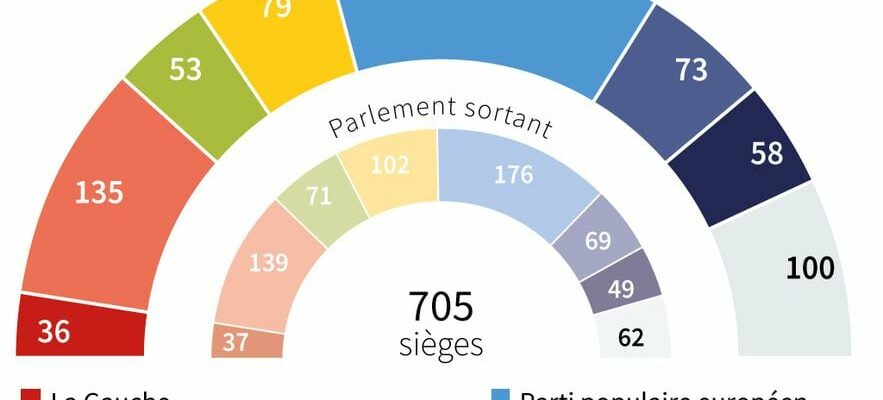At the level of the European Union, there is no French earthquake: all parties combined, the nationalist and radical right movement obtains around a quarter of the seats in the new assembly. It is difficult to be more precise because the contours of the future parliamentary group(s) remain to be defined. These forces will be organized in the coming weeks within the new European Parliament. At this stage, the reformist conservatives (ECR) have 73 elected officials, Identity and Democracy (ID) 58 including 30 from the National Rally. The 15 new German deputies from the Alternative für Deutschland (AfD), the 10 from Hungarian Viktor Orban’s Fidesz, as well as around twenty others from different European groups do not yet have a home base.
The new assembly of the European Parliament after the elections of June 9 (provisional results as of June 10 at 4:20 p.m.).
© / AFP
Mathematically, the far right will not achieve a blocking minority on future European laws because the “von der Leyen majority” (conservative right, social democrats and liberals) retains the absolute majority of seats. However, as the center of gravity of the Parliament has clearly moved towards the right, including thanks to the good score of the Christian Democrats (25.65% of the seats alone), it can hope to influence the orientations of the block in the coming years.
The focus will be on a “strong and secure” Europe
“The heads of state and government will consider how to take into account the greater number of voters who voted for the extreme right. On June 17, during their next meeting, they will have a political discussion” confirms a diplomat. Far-right ideas are in fact already spreading across the European ecosystem. This is manifested for example in the “strategic agenda”, the roadmap that the 27 leaders will set for the European Commission for the next five years. The document must be definitively adopted at the end of June. According to a draft version that leaked in recent weeks, the focus will be on a “strong and secure” Europe that protects its borders as well as competitiveness. Almost not a word on the fight against global warming – the ecological transition is only discussed through the prism of the development of green industries. “The place of the Green Deal in all this is to be determined” recognizes the same diplomatic source.
“The shift to the right could potentially affect policies on climate, migration, EU enlargement, the budget and the rule of law,” says Pawel Zerka, analyst at the European Council for Relations. international. On migration, the promoters of the “Rwanda solution” [NDLR, un accord prévoit d’expulser vers ce pays d’Afrique de l’Est les étrangers arrivés illégalement au Royaume-Uni] will feel legitimized in their demands. Moreover, during the electoral campaign, fifteen European countries, including Italy, Austria and Poland, wrote to the European Commission so that it could explore “new solutions” including the return of asylum seekers to third countries. Tracks which also appear in black and white in the electoral program of the Christian Democrats of the European People’s Party. On the enlargement side, we will have to watch for the repercussions for the advancement of discussions with Ukraine, Moldova or the Balkan countries. Finally, while the European Parliament has always been at the forefront in the defense of freedoms and the rule of law, goading national leaders who are often in no hurry to sanction one of their own, the new assembly could be much less tactful towards countries like Hungary.
“The political photography of the new Parliament increasingly resembles that of the European Council,” notes a source on the right of the chessboard. At the table of European leaders, thirteen heads of government come from the conservative right, the Italian Giorgia Meloni and the Czech Petr Fiala are members of ECR, Viktor Orban would like to get closer to them, and the far right figures in several coalitions in northern Europe, soon including the Netherlands. However, to measure the extent of the shift to the right, we will also have to wait for the result of the French legislative elections. A government led by the National Rally would constitute a new element, likely to weigh even more on European political balances.
.
